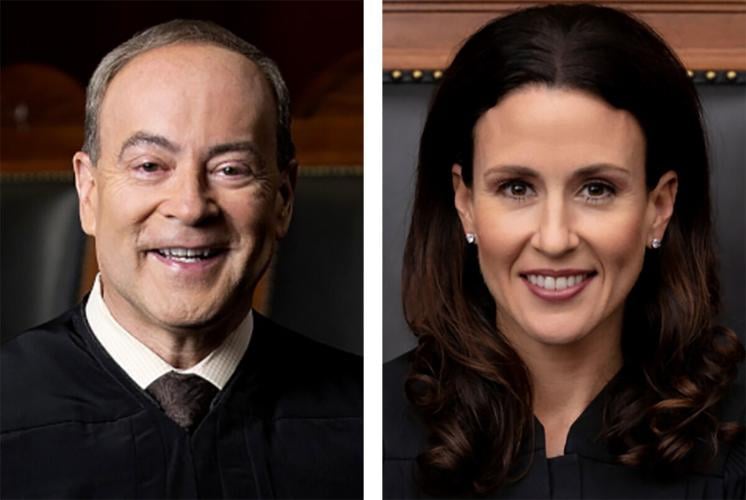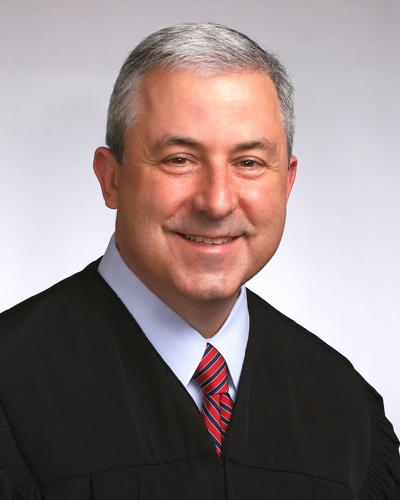PHOENIX — A judge recused himself Tuesday from deciding the legality of a statewide ballot measure that would give him and his colleagues lifetime appointments.
That begs the question: Who could hear the case without having a personal stake in the outcome?
For his part, Maricopa County Superior Court Judge Randall Warner stepped away from hearing the lawsuit at issue.
It challenges state lawmakers’ bid to scrap Arizona’s 50-year-old system that requires judges appointed by the governor to stand for reelection on a regular basis. The system gives voters a chance to decide if they want to keep judges around for another four years — or six years, for Arizona Supreme Court justices — or turn them out and give the current governor another pick.
Instead, the GOP-controlled Legislature placed a measure on the November ballot that, if voters approve it, would mean that once judges are appointed, they don’t have to worry about voters. It would allow judges to remain until mandatory retirement age of 70.
The issue came to Warner’s court Tuesday because the proposal is being challenged over whether its title is misleading as well as whether it is an unconstitutional effort by lawmakers to put multiple issues into a single ballot measure.
Only thing is, the judge has a stake in the outcome.
If Warner were to allow it to remain on the ballot and voters approve, he would no longer have to seek retention when his current term is up in 2026. That led him to question whether he should remain on the case, he told lawyers.
“It’s not about me,’’ Warner said. “It’s about appearances.’’
Now the case has to be reassigned.

Judge Randall Warner
But here’s the thing: All judges in the state’s largest counties are part of the same retain-reject system of elections. That means each is in the same position as Warner, with the same personal interest in how the case turns out.
How the system would change
At one time all judges were elected like politicians.
In 1974 voters agreed to scrap that in the largest counties in favor of a merit selection process. It allows the governor to fill vacancies, subject only to having to select from nominees who have been screened by special panels.
Then those judges stand for reelection on a regular basis. If turned out, the process starts over again.
Backers of the ballot measure, led by Sierra Vista Republican Sen. David Gowan, said this has created lengthy ballots. They also pointed out that virtually every judge up for election has been retained.
So the Legislature wants to eliminate the regular elections for all sitting judges, replacing it with a system where only judges who get into trouble would have to face voters. That trouble could include things like a personal bankruptcy, a felony conviction, or a finding by the Commission on Judicial Performance Review that their performance on the bench fell below standards.
But because the system is part of the Arizona Constitution, legislators had to give the final word to voters.
Progress Arizona, a nonprofit that has been involved in issues including voting rights, public education and immigration, filed suit.
Attorney Jim Barton argues that the title lawmakers gave to the measure — the “Judicial Accountability Act of 2024’’ — is deliberately and illegally misleading. He said it actually would eliminate the one bit of oversight voters have to remove governor-appointed judges from office.
The lawsuit also contends it violates requirements that ballot measures be limited to a single subject.
Barton said the proposal would eliminate not just the requirement for most judges to stand for reelection but also would revamp membership on the Commission on Judicial Performance Review. It also would require the commission to launch an investigation based only on a complaint by a lawmaker.
Judge raised the conflict issue
The litigation ended up in Warner’s court in a system used in Maricopa County to assign cases. It was Warner himself who raised the issue of conflict during the first hearing on the case Tuesday.
None of the attorneys involved in the case raised any objections to his handling it. But the judge himself concluded that stepping away was the right move.
Now comes the question of who would not have even the appearance of a conflict.

Arizona Supreme Court Justices Clint Bolick and Kathryn H. King.
Warner said one possibility would be to have the case heard by a judge in a rural county — meaning not Maricopa, Pima, Pinal or Coconino counties — where trial court judges continue to be elected just like any other politician. They would be unaffected by the outcome of the ballot measure.
A retired judge also could be called in.
Figuring out who handles the trial, however, is just part of the problem.
2 justices have immediate stake
This case is virtually certain to end up in front of the Arizona Supreme Court. And all seven justices are subject to the same retain-or-reject requirements that the ballot measure seeks to scrap — including two justices whose names are on this year’s ballot: Clint Bolick and Kathryn King. There is an effort by Progress Arizona to convince voters to turn the pair out of office.
If the measure stays on the ballot and is approved, it is worded to be retroactive. That means Bolick and King, appointed by Republican Doug Ducey when he was governor, could remain on the bench even if voters choose to oust them, giving them an even more immediate stake in whether the measure goes to the ballot.
It also would deny current Gov. Katie Hobbs, a Democrat, the opportunity to fill the seats.
If the justices themselves have a perceived conflict, who is left to handle the case, as there is only one Arizona Supreme Court, with no other to step in?
One option, Warner said, is the “rule of necessity.’’
That says judges don’t have to disqualify themselves over conflicts if there is no one else available to handle the legal dispute. Warner noted the justices don’t have the option to send the case somewhere else.
But Warner also noted there is precedent for something else.
Years ago, several judges challenged a decision by state lawmakers to alter the terms of their pension plan. With the then-current members of the high court affected, the justices created what amounted to a temporary Supreme Court made up of judges who were not part of that retirement system.
That sets the precedent for what could happen here, with the justices finding judges — either already retired or not planning to seek retention — who would have no stake in the outcome of the case.
For the moment, Warner set a schedule for both Progress Arizona and Republican legislative leaders, seeking to keep the measure on the Nov. 7 ballot, to start filing legal briefs, even if he is not going to be handling the case. The judge said he wants to expedite matters to ensure it gets through both a trial and the eventual Supreme Court review by early September when counties start printing up the ballots.
Get your morning recap of today's local news and read the full stories here: tucne.ws/morning





